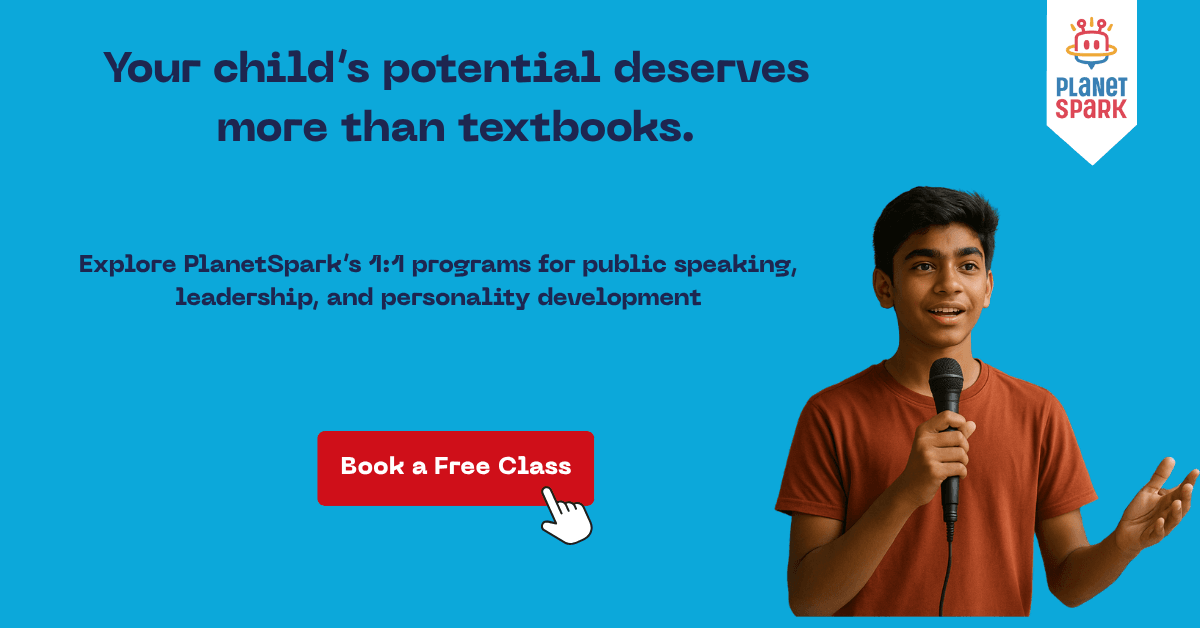Types of Soft Skills & How to Develop: A Complete Guide for Parents

Table of Contents
- Importance of Soft Skills in a Child’s Life
- 1. Communication Skills
- 2. Teamwork and Collaboration
- 3. Critical Thinking and Problem-Solving
- 4. Creativity and Imagination
- 5. Emotional Intelligence (EQ)
- 6. Leadership Skills
- 7. Adaptability and Flexibility
- 8. Time Management
- 9. Conflict Resolution
- How PlanetSpark Helps Kids Master Soft Skills
- FAQs on Types of Soft Skills
In today's competitive and fast-changing world, academic excellence alone isn’t enough for a child to succeed. What sets confident, adaptable, and future-ready individuals apart are soft skills qualities that define how your child communicates, solves problems, manages emotions, and collaborates with others. This blog breaks down the key types of soft skills, why they matter, and how you can nurture them in your child starting today.
Importance of Soft Skills in a Child’s Life
Before we dive into the types of soft skills, here’s why they matter so much especially in the foundational school years:
Enhance communication: Soft skills help children express thoughts clearly and listen actively.
Boost confidence and leadership: Essential in both school and later career life.
Support academic performance: Skills like time management, collaboration, and focus directly impact learning outcomes.
Improve emotional intelligence: Children become more resilient, empathetic, and emotionally aware.
Make children future-ready: Soft skills are in high demand in 21st-century careers, regardless of industry.

1. Communication Skills
What It Means:
The ability to express oneself clearly, listen actively, and engage in meaningful conversation both verbal and non-verbal.
Why It Matters:
Good communication builds confidence, reduces misunderstandings, and enables a child to participate actively in class discussions, group work, and daily interactions.
How to Develop:
Encourage daily sharing: Ask your child to narrate their day or describe a story in their own words.
Practice storytelling and roleplay games.
Use mirror practice to work on body language and eye contact.
Teach active listening by asking them to summarize what someone else said.
Engage in friendly debates or opinion-based discussions at home.
🟢 “Let your child speak up, stand tall, and shine with confidence.”
Book a Free 1:1 Public Speaking Class by PlanetSpark!
2. Teamwork and Collaboration
What It Means:
Working effectively and respectfully with others towards a shared goal.
Why It Matters:
Teamwork helps kids learn patience, compromise, and responsibility, qualities they’ll need in classrooms, sports, projects, and eventually the workplace.
How to Develop:
Assign group tasks or family activities like planning a picnic or creating a craft.
Enrol your child in clubs or sports teams.
Praise cooperative behavior when they share or help others.
Use collaborative board games or build-with-me STEM toys to practice shared problem-solving.
3. Critical Thinking and Problem-Solving
What It Means:
The ability to analyze situations, think logically, and make informed decisions.
Why It Matters:
It helps children become independent thinkers who can evaluate situations, troubleshoot issues, and come up with creative solutions vital for real-life challenges.
How to Develop:
Ask “What would you do if…” scenario questions during conversations.
Use logic puzzles, brainteasers, and riddles.
Let them solve age-appropriate real-world problems, like managing pocket money or planning a route.
Encourage project-based learning and experiments.
4. Creativity and Imagination
What It Means:
The ability to think outside the box, express new ideas, and innovate.
Why It Matters:
Creativity is the core of innovation. It allows children to explore possibilities, write freely, and express themselves in unique ways.
How to Develop:
Let your child journal or create short stories.
Use drawing, Lego building, or craft kits to engage imagination.
Avoid over-scheduling let them get bored and invent their own play.
Expose them to different books, music, and cultures.
🟢 “Every child is a storyteller help them find their voice.”
Try PlanetSpark’s Creative Writing Classes Today!
5. Emotional Intelligence (EQ)
What It Means:
Recognizing, understanding, and managing one’s emotions, and empathizing with others.
Why It Matters:
EQ enhances resilience, kindness, and better peer relationships. It helps reduce stress and builds strong social skills.
How to Develop:
Name emotions aloud: “You’re feeling frustrated because...”
Teach simple breathing or mindfulness techniques.
Use books or shows to discuss how characters feel and react.
Encourage journaling feelings in a “Feelings Diary.”
6. Leadership Skills
What It Means:
Taking initiative, motivating others, managing responsibilities, and making decisions.
Why It Matters:
Leadership builds confidence, decision-making abilities, and a sense of ownership. It’s essential for school captains today and CEOs tomorrow.
How to Develop:
Give your child simple responsibilities like setting the dinner table or managing a family calendar.
Let them lead group tasks or play leader in role-play games.
Highlight famous young leaders and their stories.
Offer positive reinforcement for initiative.
“Little leaders grow into confident changemakers.”
Enroll your child in PlanetSpark’s Leadership Building Activities!
7. Adaptability and Flexibility
What It Means:
The ability to cope with change and adjust to new situations.
Why It Matters:
In a world where change is constant, adaptability helps kids handle transitions like school changes, new subjects, and group dynamics.
How to Develop:
Prepare your child in advance for changes in routine.
Play “what if” games to explore handling different situations.
Practice creative thinking during unstructured play.
Encourage trying new foods, hobbies, or methods of learning.
“Adaptable kids are future-ready kids.”
PlanetSpark helps children build confidence in every situation.
8. Time Management
What It Means:
Managing time effectively to balance studies, play, chores, and rest.
Why It Matters:
Time management builds discipline and reduces stress, an essential skill for academic and life success.
How to Develop:
Use visual schedules or planners.
Set clear but flexible routines.
Break tasks into chunks and reward completion.
Let them plan their own timetable with your guidance.
“Teach them to value time and they’ll never be behind.”
PlanetSpark’s learning system includes goal tracking and daily routines.
9. Conflict Resolution
What It Means:
Managing disagreements in a calm, respectful, and solution-oriented way.
Why It Matters:
This helps children avoid unnecessary fights, express themselves constructively, and maintain healthier relationships.
How to Develop:
Teach them to use “I feel” statements: “I feel upset when you…”
Roleplay common conflict scenarios.
Reinforce taking turns and listening before responding.
Praise peaceful problem-solving.

How PlanetSpark Helps Kids Master Soft Skills
Where real growth meets real results.
Here’s how PlanetSpark helps your child build all the above soft skills through structured, engaging, and personalized learning:
🔹 1:1 personal training by expert communication coaches
🔹 Customized learning roadmap for every child
🔹 Public speaking, creative writing & personality programs
🔹 SparkX – Live speaking events, debates, and storytelling
🔹 Gamified tools, leaderboards & badges for motivation
🔹 Daily quizzes, vocabulary & speaking challenges
🔹 Spark Diary for goal tracking and personal reflection
🔹 Parent-Teacher Meetings and detailed progress reports
🔹 Safe peer learning spaces: podcasting, writing clubs, etc.
🔹 Sparkline – Share your child’s work in a secure community
Help your child grow into a confident communicator, compassionate friend, and powerful leader, one soft skill at a time.
Book Your FREE 1:1 Trial Class Now!
FAQs on Types of Soft Skills
Q1. What are the top 5 soft skills every child must learn?
A: Communication, Emotional Intelligence, Teamwork, Critical Thinking, and Time Management.
Q2. Can soft skills be taught or are they inborn?
A: Soft skills can definitely be taught and developed over time with consistent practice and the right environment.
Q3. At what age should kids start learning soft skills?
A: As early as 4–5 years! Skills like empathy, listening, and communication can be introduced through play and routine.
Q4. How is PlanetSpark different from regular tutoring platforms?
A: PlanetSpark focuses on communication, leadership, and emotional development not just academics. Every class is live, personalized, and backed by a detailed roadmap.
Q5. Do soft skills help in academics too?
A: Yes. Time management, focus, confidence, and collaboration directly improve performance in school and exams.
Personalized Communication Report
Record a video to get a AI generated personalized communication report for your child

Hi There, want to try these
tips for your child with
LIVE with our expert coach?
Let's check your child's
English fluency
